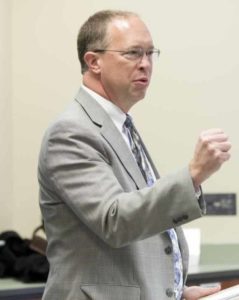
Finding Common Ground on our “Islands of Sanity”: Preserving Classical Tradition in a World of Chaos
 In 2003, author and economist Thomas Sowell sent a letter to then-Hillsdale Academy Headmaster Ken Calvert, thanking the school for being “an island of sanity in a crazy educational world.” Indeed, classical schools such as Hillsdale Academy strive to provide a stable environment rooted in the books and educational methods that have stood the test of time, a contrast to the shifting trends in our modern day.
In 2003, author and economist Thomas Sowell sent a letter to then-Hillsdale Academy Headmaster Ken Calvert, thanking the school for being “an island of sanity in a crazy educational world.” Indeed, classical schools such as Hillsdale Academy strive to provide a stable environment rooted in the books and educational methods that have stood the test of time, a contrast to the shifting trends in our modern day.
At a presentation to teachers and administrators from Barney Charter School Initiative schools held on the Hillsdale campus in June, Calvert outlined the common heritage between classical schools—whether public charter or private Christian—and offered encouragement for today’s teachers.
- Education should preserve and transmit the past. That seems basic enough, doesn’t it? Yet we “suffer from arrogance of the modern,” Calvert said—the notion that the ancients have nothing to teach us today. History, however, is ripe with stories of failure, stories that can teach future generations so that those same mistakes aren’t repeated. “When any ancient society lost confidence in their convictions, they failed,” he said. The Athenians, the Roman Republic, the Roman Empire—all collapsed because they “lost sight of what had made them great. But we don’t have to be fated for cultural collapse today,” Calvert said.
- Struggle can be good. Today’s teachers and administrators are faced with a plethora of issues—Common Core, identity politics, broken families, the avoidance of struggle (as in everyone gets an “A”)—indeed, “the very order of things being ripped apart,” according to Calvert. There’s also a mindset that certain academic subjects, such as cursive, don’t matter anymore and won’t be useful in life. But these struggles provide learning opportunities: they shape our minds, and on the “islands of sanity” that are classical schools, these struggles are welcomed.
Calvert gave two examples from the early Middle Ages of men who established “islands of sanity” in the midst of struggles and chaos around them. The Roman senator and scholar Boethius wrote On the Consolation of Philosophy, now considered one of Western Civilization’s greatest works, while in prison awaiting his execution. He had attempted to guide the Ostrogothic King, Theodoric, but failed; the king, who had grown paranoid of Boethius, sentenced him to death. Through writing this work, Calvert asserted, Boethius discovered a much larger truth and peace in the midst of struggle. “He lived in an age of chaos and insanity that needed reordering and a return to virtue,” Calvert said. Likewise, the Roman senator-scholar Cassiodorus fled the chaos of Rome and started a monastery. There, he tasked monks with copying ancient texts in an effort to preserve classical works of philosophy and literature while also “Christianizing” them. - Islands of sanity were needed in the past and are needed now. Boethius asserted that we must order ourselves, our families, and our communities as the laws of nature are ordered. The liberal arts teach us how to reason and how to order ourselves with the virtues of prudence, justice, temperance, and courage. To that, Cassiodorus added the Christian virtues of faith, hope, charity, and the fruits of the Spirit. These understandings of the laws of nature and of nature’s God—which helped give Boethius and Cassiodorus islands of sanity in the midst of struggles around them—help us find synthesis in our classical schools, whether public charter or classical Christian.
While there will always be those working against classical schools, “struggle can shape greater virtue,” Calvert said. “Our islands of sanity are not distant and disconnected from each other. They are connected by the continent of natural law. The shifting sands around us will fall away.”